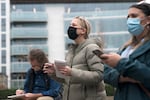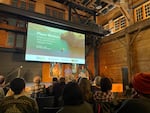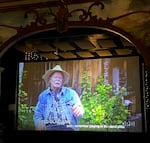Since OPB’s founding in Corvallis, Oregon in 1922, public service has been deep in our bones.
As an independent nonprofit organization, OPB is driven to meet our mission: connecting people across Oregon and the Pacific Northwest through the power of a shared story.
But how do we know that we’re meeting that mission? Ultimately, it’s about understanding the positive impacts we make in the lives of people all across the region.
Our trusted reporting—freely available to everyone thanks to member support—helps people make informed decisions and holds institutions and officials accountable. We provide critical information and alerts to communities during emergencies such as severe storms, earthquakes or wildfires. We host community events that bring people together to help better understand our region and what it means to live here.
Here, you’ll learn how we’ve put our values into action, and how our work has made a difference for communities across the Northwest.
Storytelling that serves the public

OPB political reporter Lauren Dake asks a question during a press conference in Portland, Oct. 27, 2021.
Kristyna Wentz-Graff / OPB
Investigating the management of old growth forests – a critical public resource
Logging is of the biggest issues facing Pacific Northwest habitats, people and industries today, and one that OPB has reported on in depth over the years. In November 2024, we collaborated with ProPublica on a wide-ranging investigative story on timber harvests in Bureau of Land Management forests, which gave the people of the region a look into whether President Biden’s executive order for protecting these mature and old growth forests – a critical public resource – was being implemented. It demonstrated our commitment to accountability reporting regardless of which political party controls the executive branch.
Exposing groundwater mismanagement and drinking water safety in Crook County
In 2023, OPB Reporter Emily Cureton Cook exposed lax mining regulation and data collection that put residents in Central Oregon at risk of drinking tainted water. Her series of investigative stories looked into the management of groundwater across Eastern Oregon after Crook County residents reported tap water that looked like mud, mysterious livestock deaths and plumbing nightmares. Her investigation found regulators swiftly dismissed complaints of contaminated wells and ignored possible permit violations by a multi-billion-dollar mining company. This reporting led Oregon’s Department of Environmental Quality to take a second review of the issue, and also to a lawsuit from Crook County residents against state and local governments for letting a gravel mine continue operating in their rural neighborhood near Prineville.
Leveraging partnerships for greater accountability to communities.
The disappearance of salmon in the Pacific Northwest is deeply concerning for many people in our region, including native communities. Over the last two years, OPB and ProPublica have partnered to investigate the hidden history of salmon decline in the Northwest, who is to blame, what can be done before it’s too late and why salmon disappearance impacts all of us.
Our reporting revealed levels of toxic chemicals in Columbia River salmon that state health agencies deem unsafe when consumed at the quantities that many of the region’s 68,000-plus tribal people consume. Our reporting, which also included a documentary film and podcast, uncovered important accountability for our region’s Native communities and educated us all about the plight of the salmon of the Columbia River and the Native people whose lives revolve around them. We hosted a screening and panel discussion with the individuals who helped bring the film to life at the Columbia Gorge Discovery Center & Museum.

Salmon Wars screening in partnership with the Columbia Gorge Discovery Center & Museum.
opb / OPB
In 2019, OPB political reporter Lauren Dake examined how Oregon’s foster care system had grown reliant on a private, for-profit company to house the state’s most vulnerable children in out-of-state facilities. As a result of this reporting, all children involved with this contractor were brought back to Oregon, and two U.S. senators began investigating abuse at facilities that run treatment programs for children.
Initiating positive change at the Chemawa Indian School.
In 2019, our five-part investigative series into the Chemawa Indian School near Salem examined the many ways the school struggled to prepare students for college or careers in a safe and stable place. In response to our reporting, U.S. Sens. Merkley and Wyden, along with Reps. Bonamici and Schrader, opened investigations into the school’s management and pushed for major reforms. OPB reporters Rob Manning and Tony Schick worked for three years to bring this important story to light.

Chemawa Indian School is the oldest continuously running off-reservation Indian boarding school.
Rob Manning / OPB
A journey through rural Oregon by public transit
In Fall 2024, we launched “Stop Requested,” a multi-part audio and digital series. It documents a journey through rural Oregon by public transit to all the communities that OPB mentions on the radio every hour. Over 14 days and more than 30 buses, we helped people around our region understand the challenges faced by rural communities as they navigate limited transit options. It puts a spotlight on the vital role of public transportation in keeping rural Oregonians connected, and it also celebrates the beauty of Oregon’s rural places and people.
Creating connection in eastern Oregon.
In 2024, more than 400 people in La Grande gathered and discovered local history through OPB storytelling. At a screening for our documentary “Horsewomen of the Hen Party,” they learned about local resident Jean Birnie’s all-female horse packing trips into the rugged Wallowa Mountains that began in the early 20th century. Nearly a century later, her descendants still celebrate the extraordinary landscape and intimate connection with nature that Jean passed on to them. The event revealed the power of a shared story, evoking local nostalgia and community learning.
Keeping residents safe with wildfire and winter weather resources.
OPB helped residents stay informed and safe during another record-setting fire season last year in the Pacific Northwest. Our wildfires and air quality information hub online provided comprehensive news coverage and essential resources, including an interactive fire map showing where fires are burning, the latest smoke outlook and information about what wildfire recovery looks like.During severe winter weather, OPB’s winter weather hub offered a variety of resources to help residents prepare, such as the latest flash alerts, closures information, road and driving conditions and home readiness tips
Connecting Oregonians through culture, history and collaboration
Celebrating rural performing arts at the OK Theatre
The Oregon Art Beat team partnered with the OK Theatre in Enterprise, Oregon, to organize a showcase of Oregon Art Beat episodes about artists in the region, including a documentary about the OK Theatre’s history and restoration. In addition to screening the OAB episode, the event included food and beer from local vendors and performances by local musicians. Through the storytelling process and the in-person event, OPB developed trust with a community that can sometimes feel disconnected from OPB. And, through the power of shared stories, the event helped to narrow the urban-rural divide that Oregonians have long felt.

The Oregon Art Beat team partnered with the OK Theatre in Enterprise, Ore. to organize a screening of the Oregon Art Beat episode about the restoration of the OK Theatre.
opb / OPB
Honoring Oregon’s Chicano history
In ‘The Living Legacy of Colegio César Chávez’, our Oregon Experience team shares the story of the first and only independent accredited Chicano university in the United States. Around the same time as the premiere of ‘The Living Legacy of Colegio César Chávez’, Oregon Historical Society held an exhibit about the history of the university. We partnered with Poder, Oregon’s Latino Leadership Network, to host a screening of the episode and panel discussion with the leaders featured in the film at the Oregon Historical Society. The standing-room-only event was bilingual in English and Spanish and sparked an intergenerational dialogue about the past and future of Oregon’s Chicano community.

Oregon Historical Society hosts a screening of OPB’s newest episode of Oregon Experience on the history of Colegio César Chávez on Jan. 22, 2025.
opb / OPB
How our community shapes our work: OPB's Community Advisory Board
OPB’s Community Advisory Board (CAB) plays a vital role in helping us reflect the diverse voices and needs of the communities we serve. Members provide valuable insights on the issues that matter most to our communities, helping to shape our coverage, programs and outreach. The CAB helps ensure that our work remains inclusive, relevant and accountable across Oregon and the Pacific Northwest. If you’d like additional information about the CAB, please feel free to reach out to Rad Probst, OPB’s Executive Administrator and Board Liaison.
Our CAB members
Lesley Albert; Portland, OR
John Bloss; Gaston, OR
Linda Castillo; Portland, OR
Sokho Eath; Portland, OR
Alex Garfield; Tualatin, OR
Connie Green; Salem, OR
Stephen Green; Portland, OR
Andréa Guedes; Portland, OR
Tracey Lam; Portland, OR
Pat Lynch; Sutherlin, OR
Katy Nesbitt; Enterprise, OR
Julie Nist; Bend, OR
Melanie Potter; Portland, OR
Nikki Pritchard; Coos Bay, OR
John Riutta; Scappoose, OR
Tamara Russell; Depoe Bay and Lake Oswego, OR
Rick Short; Portland, OR
Teresa St. Martin; Portland, OR
Sam Stites; Vancouver, WA
